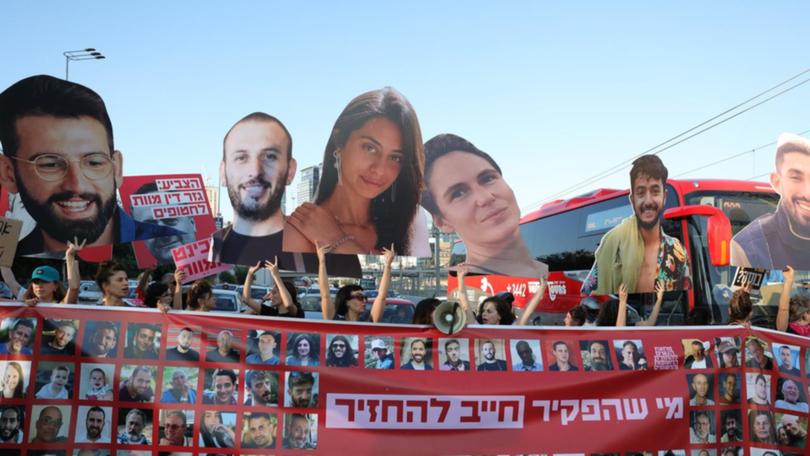Middle East: Israel’s Ben Gurion Airport closes after union calls strike as hostage deal pressure rises
Israel’s main airport is closed as protesters take to the streets in an outpouring of grief and anger after the bodies of six hostages held by Hamas were found in the Gaza Strip.

The head of Israel’s biggest labour union has called for a general strike to pressure Prime Minister Benjamin Netanyahu’s government to bring back Israeli hostages still held by Hamas in the Gaza Strip as thousands of protesters took to the streets.
Earlier, Israel recovered the bodies of six hostages from a tunnel in southern Gaza where they were apparently killed not long before Israeli troops reached them, according to the military, prompting fury and grief among Israelis.
The call for a one-day general strike on Monday by Arnon Bar-David, whose Histadrut union represents hundreds of thousands of workers, was backed by Israel’s main manufacturers and entrepreneurs in the high-tech sector.
Sign up to The Nightly's newsletters.
Get the first look at the digital newspaper, curated daily stories and breaking headlines delivered to your inbox.
By continuing you agree to our Terms and Privacy Policy.The alliance of some of the most powerful voices in Israel’s economy reflected the scale of public anger over the deaths of the six hostages, who were among some 250 people seized by Hamas militants on October 7 last year.
“We must reach a deal (on the return of the surviving hostages). A deal is more important than anything else,” Bar-David told a press conference.
“We are getting body bags instead of a deal.”
Ben Gurion Airport, Israel’s main air transport hub, will be closed from 8am on Monday, he said.
Municipal services in Israel’s economic hub Tel Aviv will also be shut for part of Monday.
Israel’s Manufacturers’ Association said it backed the strike and accused the government of failing in its “moral duty” to bring the hostages back alive.
“Without the return of the hostages we will not be able to end the war, we will not be able to rehabilitate ourselves as a society and we will not be able to begin to rehabilitate the Israeli economy,” association head Ron Tomer said.
Israeli opposition leader and former prime minister Yair Lapid earlier threw his support behind the strike action.
Thousands of protesters blocked roads on Sunday in Jerusalem and Tel Aviv and demonstrated outside Netanyahu’s residence.
The Hostages Families Forum, which represents the families of some of those held in Gaza, said the death of the six was the direct result of Netanyahu’s failure to secure a deal to halt the fighting and bring their loved ones home.
“They were all murdered in the last few days, after surviving almost 11 months of abuse, torture and starvation in Hamas captivity,” the group said in a statement.
The six include the body of Hersh Goldberg-Polin, 23, a dual US-Israeli citizen and arguably the best-known hostage.
His parents had recently spoken at the US Democratic National Convention in Chicago, pleading for his release.
The other hostages were: Alexander Lobanov, 32, Almog Sarusi, 27, Ori Danino, 25, and two women - Carmel Gat, 40, and Eden Yerushalmi, 24.
About a third of the 101 Israeli and foreign captives still in Gaza are believed to have died, with the fate of the others unknown.
Netanyahu and many hardliners in his government, as well as their supporters, remain opposed to any hostage deal that would release militants from Israeli prisons and help to keep Hamas in power.
Netanyahu said on Sunday Israel was committed to concluding a hostage deal but he blamed Hamas for refusing to accept proposals agreed with the United States.
Israeli Defence Minister Yoav Gallant also urged Netanyahu on Sunday to conclude a ceasefire deal with Hamas.
“It’s too late for the abductees who were murdered in cold blood. The abductees who remain in the captivity of Hamas must be returned home,” he said on X.
“The political-security cabinet must convene immediately and reverse the decision made on Thursday,” he said, referring to a decision by the cabinet to insist on keeping troops in the so-called Philadelphi corridor, along the southern edge of the Gaza Strip.
Netanyahu’s insistence on keeping troops in the corridor to prevent Hamas from smuggling weapons in from Egypt, has been widely seen as one of the major obstacles to an agreement with Hamas in talks brokered by Egypt and Qatar.
- With DPA
